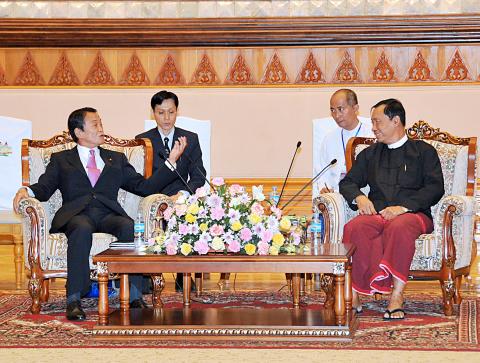Japan’s Deputy Prime Minister Taro Aso confirmed fresh financial aid for Myanmar on Friday during a visit to an industrial zone that underlined the long-isolated nation’s growing importance as an economic partner.
With a land mass as large as Britain and France combined, Myanmar shares borders with 40 percent of the world’s population in India, China, Bangladesh and Thailand.
Burmese President Thein Sein’s quasi-civilian government has enacted reforms since it took over from a long-ruling military junta nearly two years ago.

Photo: EPA
Aso, who is also Japan’s finance minister, chose the country for his first official visit abroad just a week after taking up the position.
His visit sets the stage for Japanese firms to gain privileged access to Myanmar as Western competitors move in slowly after years of economic sanctions.
“I can feel Myanmar has very big potential. It is our intention to support its development through private-public partnership,” Aso said as he visited Thilawa, a US$12.6 billion, 2,400 hectare special economic zone and centerpiece of Japan-Myanmar relations.
Mitsubishi Corp, Marubeni Corp and Sumitomo Corp form the Japanese side of the joint development of the industrial park. The plan is to build the first 400 hectares by 2015 and start luring Japanese and global manufacturers.
Aso confirmed during the visit that Tokyo would waive part of Myanmar’s ¥500 billion (US$5.74 billion) debt and make a fresh loan of ¥50 billion, partly to kick-start construction of Thilawa.
“The Myanmar side has thanked us for waiving their debts many times,” Aso told reporters in Yangon. “I hope this will serve as a first step in boosting Myanmar’s economic development.”
Aso, a senior member of the Japan-Myanmar Association, had arranged the visit before he was appointed, but took many by surprise with his decision to go despite a busy domestic agenda.
Aiming to offset the economic impact of Tokyo’s frayed relations with Beijing, Japanese Prime Minister Shinzo Abe’s new administration has been reaching out to other Asian neighbors, pledging to send special envoys to improve ties with both South Korea and Russia.
Myanmar is still re-working its laws governing special economic zones after passing new foreign direct investment laws last year. Officials hope Thilawa will bring employment to the job-starved country, helping it stabilize during a period of social and economic upheaval.
“With the help of Japan and its technology, we will be able to create jobs for the people and enter a new age of economic development,” said Win Aung, who heads the Myanmar side of the consortium.
Japan is also investing in an economic zone in Dawei, where the largest industrial complex in Southeast Asia is on the drawing board.

A fire caused by a burst gas pipe yesterday spread to several homes and sent a fireball soaring into the sky outside Malaysia’s largest city, injuring more than 100 people. The towering inferno near a gas station in Putra Heights outside Kuala Lumpur was visible for kilometers and lasted for several hours. It happened during a public holiday as Muslims, who are the majority in Malaysia, celebrate the second day of Eid al-Fitr. National oil company Petronas said the fire started at one of its gas pipelines at 8:10am and the affected pipeline was later isolated. Disaster management officials said shutting the

US Vice President J.D. Vance on Friday accused Denmark of not having done enough to protect Greenland, when he visited the strategically placed and resource-rich Danish territory coveted by US President Donald Trump. Vance made his comment during a trip to the Pituffik Space Base in northwestern Greenland, a visit viewed by Copenhagen and Nuuk as a provocation. “Our message to Denmark is very simple: You have not done a good job by the people of Greenland,” Vance told a news conference. “You have under-invested in the people of Greenland, and you have under-invested in the security architecture of this

Japan unveiled a plan on Thursday to evacuate around 120,000 residents and tourists from its southern islets near Taiwan within six days in the event of an “emergency”. The plan was put together as “the security situation surrounding our nation grows severe” and with an “emergency” in mind, the government’s crisis management office said. Exactly what that emergency might be was left unspecified in the plan but it envisages the evacuation of around 120,000 people in five Japanese islets close to Taiwan. China claims Taiwan as part of its territory and has stepped up military pressure in recent years, including

UNREST: The authorities in Turkey arrested 13 Turkish journalists in five days, deported a BBC correspondent and on Thursday arrested a reporter from Sweden Waving flags and chanting slogans, many hundreds of thousands of anti-government demonstrators on Saturday rallied in Istanbul, Turkey, in defence of democracy after the arrest of Istanbul Mayor Ekrem Imamoglu which sparked Turkey’s worst street unrest in more than a decade. Under a cloudless blue sky, vast crowds gathered in Maltepe on the Asian side of Turkey’s biggest city on the eve of the Eid al-Fitr celebration which started yesterday, marking the end of Ramadan. Ozgur Ozel, chairman of the main opposition Republican People’s Party (CHP), which organized the rally, said there were 2.2 million people in the crowd, but